
 i_need_contribute
i_need_contribute
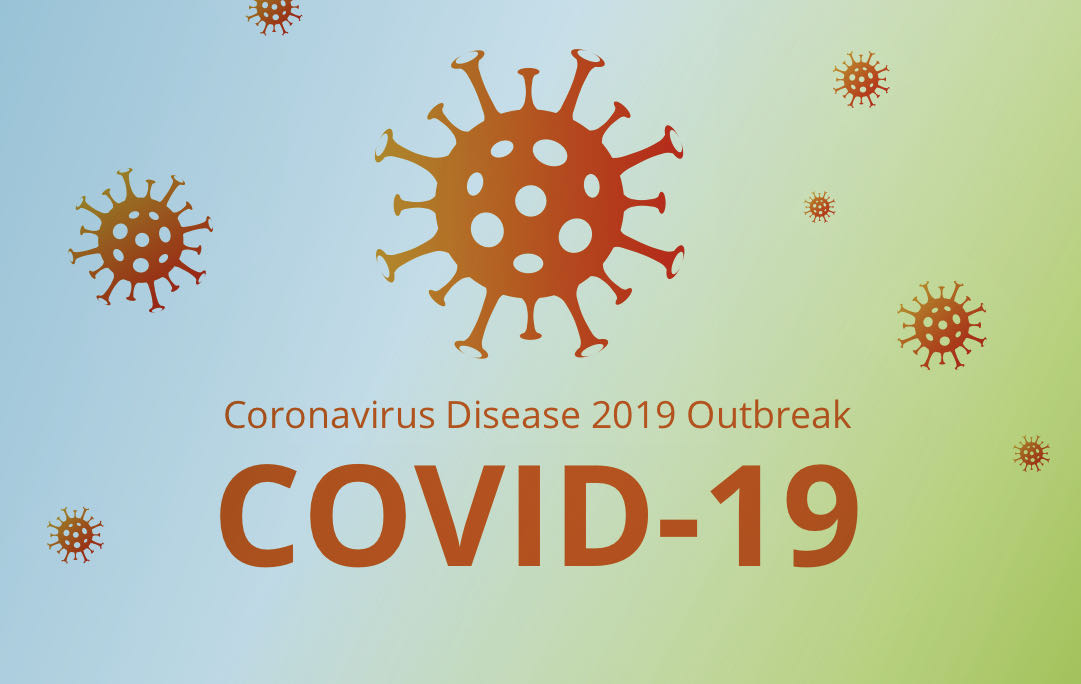
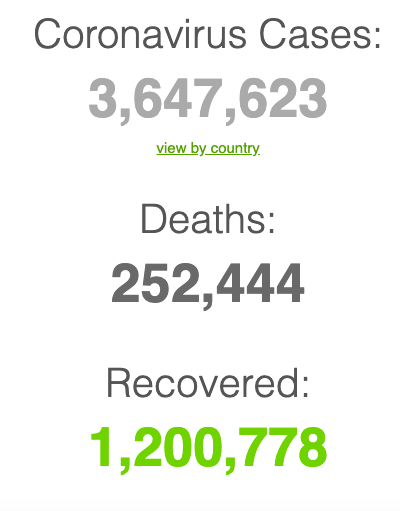

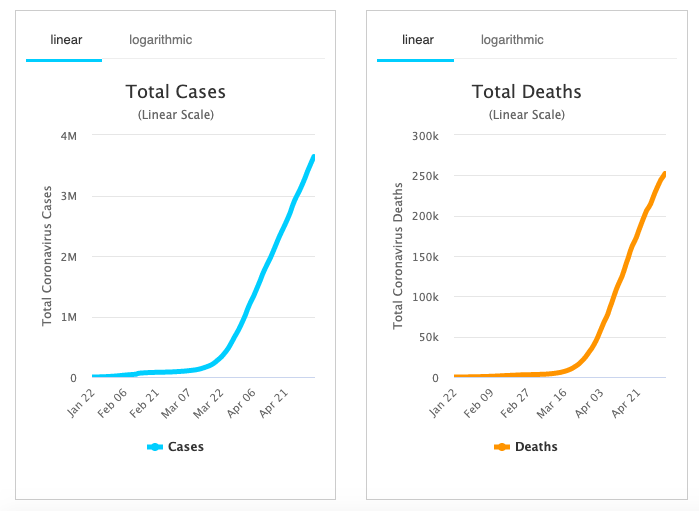
|
Country, |
Total |
New |
Total |
|
World |
3,643,271 |
+79,582 |
252,241 |
|
1,212,835 |
+24,713 |
69,921 |
|
|
248,301 |
+1,179 |
25,428 |
|
|
211,938 |
+1,221 |
29,079 |
|
|
190,584 |
+3,985 |
28,734 |
|
|
169,462 |
+769 |
25,201 |
|
|
166,152 |
+488 |
6,993 |
|
|
145,268 |
+10,581 |
1,356 |
|
|
127,659 |
+1,614 |
3,461 |
|
|
108,266 |
+7,119 |
7,343 |
|
|
98,647 |
+1,223 |
6,277 |
|
|
82,880 |
+3 |
4,633 |
|
|
60,772 |
+1,298 |
3,854 |
|
|
50,267 |
+361 |
7,924 |
|
|
47,372 |
+1,444 |
1,344 |
|
|
46,437 |
+3,932 |
1,566 |
|
|
40,770 |
+199 |
5,082 |
|
|
31,881 |
+2,343 |
1,569 |
|
|
29,981 |
+76 |
1,784 |
|
|
28,656 |
+1,645 |
191 |
|
|
25,524 |
+242 |
1,063 |
|
|
23,471 |
+1,383 |
2,154 |
|
|
22,721 |
+404 |
2,769 |
|
|
21,772 |
+266 |
1,319 |
|
|
20,941 |
+857 |
476 |
|
|
20,643 |
+980 |
270 |
|
|
18,778 |
+573 |
18 |
|
|
17,489 |
+784 |
103 |
|
|
16,246 |
+38 |
235 |
|
|
16,191 |
+640 |
12 |
|
|
15,621 |
+24 |
600 |
|
|
15,078 |
+201 |
536 |
|
|
14,730 |
+567 |
137 |
|
|
14,006 |
+313 |
698 |
|
|
13,512 |
+349 |
818 |
|
|
12,331 |
+418 |
303 |
|
|
11,587 |
+395 |
864 |
|
|
10,801 |
+8 |
252 |
|
|
10,143 |
+688 |
182 |
|
|
9,670 |
+147 |
493 |
|
|
9,557 |
+93 |
197 |
|
|
9,485 |
+262 |
623 |
|
|
8,235 |
+281 |
346 |
|
|
7,973 |
+305 |
358 |
|
|
7,904 |
+57 |
214 |
|
|
7,819 |
+38 |
252 |
|
|
7,220 |
+437 |
138 |
|
|
7,197 |
+107 |
200 |
|
|
6,825 |
+24 |
95 |
|
|
6,813 |
+348 |
436 |
|
|
6,353 |
+55 |
105 |
|
|
5,327 |
+73 |
240 |
|
|
5,278 |
+295 |
40 |
|
|
5,053 |
+150 |
179 |
|
|
4,887 |
+104 |
260 |
|
|
4,648 |
+174 |
465 |
|
|
4,248 |
+127 |
132 |
|
|
4,049 |
+129 |
29 |
|
|
3,828 |
+4 |
96 |
|
|
3,533 |
+150 |
8 |
|
|
3,035 |
+37 |
351 |
|
|
2,987 |
+18 |
54 |
|
|
2,894 |
+190 |
90 |
|
|
2,802 |
+244 |
93 |
|
|
2,719 |
+550 |
18 |
|
|
2,637 |
+69 |
12 |
The New York Times
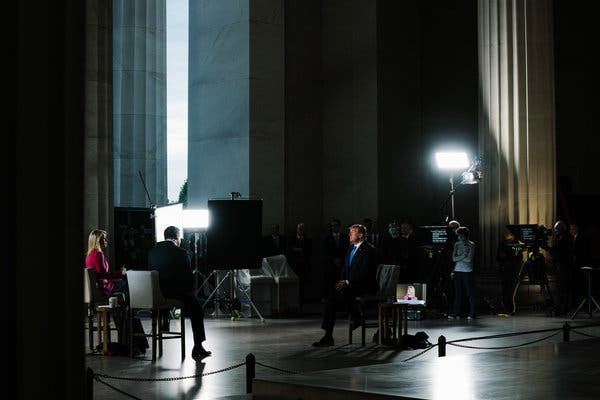
A fund-raising conference on Monday organized by the European Union brought pledges from countries around the world — including Japan, Canada, Australia and Norway — to fund laboratories that have promising leads in developing and producing a vaccine.
Prime ministers, a king, a prince and Madonna all chipped in to an $8 billion pot to fund a coronavirus vaccine, but President Trump skipped the chance to contribute. Officials in his administration noted that the United States is pouring billions of dollars into its own research efforts.
For more than three hours, one by one, global leaders said a few words over video link and offered their nations’ contribution, small or large, whatever they could muster. For Romania, it was $200,000. For Canada, $850 million. The biggest contributors were the European Union and Norway, with each pledging one billion euros, or $1.1 billion.
A rendering of the outer shell of an adeno-associated virus with the exterior partially removed. The shell is used as a Trojan horse to deliver a genetic component of the coronavirus to raise an immune response.Credit...Eric Zinn and Luk H. Vandenberghe
Researchers at two Harvard-affiliated hospitals are adapting a proven form of gene therapy to develop a coronavirus vaccine, which they expect to test in people later this year, they announced on Monday.
Their work employs a method already used in gene therapy for two inherited diseases, including a form of blindness: It uses a harmless virus as a vector, or carrier, to bring DNA into the patient’s cells. In this case, the DNA should instruct the cells to make a coronavirus protein that would stimulate the immune system to fight off future infections.
Three medical workers in Russia who had been in disputes with the health authorities over handling the coronavirus have plunged from upper-story windows, local news outlets have reported.
Some reports suggested that the falls, which killed two doctors and left a third in critical condition, were suicides or accidents.
They came amid a police crackdown on doctors who have publicly criticized the government’s response. Russian dissidents have long attributed mysterious falls from balconies and other apparent accidents to state violence.
Aleksandr Shulepov, a medic for an ambulance service in the Voronezh region, south of Moscow, fell on Saturday from a window of a hospital where he was being treated for Covid-19. He was in critical conduction with a fractured skull.
He and a colleague had complained in online videos about a lack of personal protective equipment. He also said he was required to continue working after he tested positive for the virus, according to Vesti Voronezh, a local newspaper.
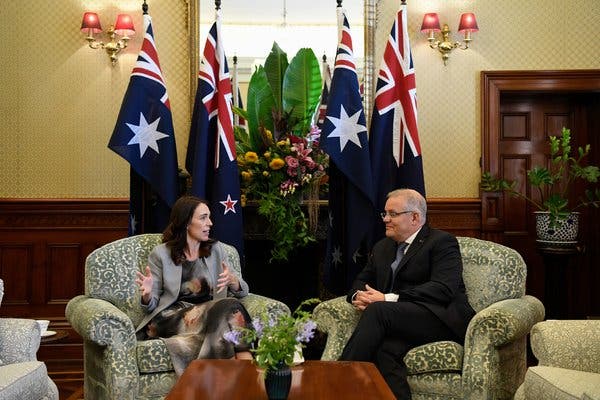
Prime Ministers Jacinda Ardern of New Zealand and Scott Morrison of Australia in Sydney in February.Credit...Pool photo by Bianca De Marchi
Australia and New Zealand are moving closer toward creating a “travel bubble” that would allow people to fly between the two countries without quarantines — a resumption of traffic that would be a boost for both countries’ economies.
Prime Minister Jacinda Ardern of New Zealand, who joined Australia’s cabinet meeting on Tuesday to discuss the steps required, said on Monday that the move would depend on continued progress in testing and tracing of coronavirus infections in both countries. That could take weeks or months.
But she emphasized that the prospect of revived travel reflected the shared success of Australia and New Zealand, which have crushed the peaks of their initial outbreaks faster than expected.
“Both our countries’ strong record of fighting the virus has placed us in the enviable position of being able to plan the next stage in our economic rebuild,” she said.
Ms. Ardern and Prime Minister Scott Morrison of Australia told reporters on Tuesday that the ‘bubble’ is an important part of the road back to normalcy for both nations.
From CNN's Jessie Yeung in Hong Kong
Pro-democracy protestors observe social distancing measures as th Anthony Wallace/AFP/Getty Images
Alvin Yau is exhausted. Like other residents in Hong Kong, he hasn't had a break in nearly a year, ricocheting from one crisis to the next.
When Hong Kong was consumed by anti-government, pro-democracy protests last year, the 25-year-old banking analyst found himself constantly on edge, unable to sleep at night, and so overwhelmed he once burst into tears in the middle of the street.
The political chaos began calming somewhat in December -- but only weeks later, the first reports emerged of a mysterious new virus across the border in mainland China.
The novel coronavirus has since exploded into a global pandemic, infecting more than 3.5 million people globally and killing more than 251,000. In Hong Kong, there have been more than 1,040 cases -- relatively low due to months of stringent quarantine measures and closed borders.
But the pandemic dealt a second blow to a population already devastated by six months of violent unrest -- and now, experts warn it could culminate in a mental health crisis.
From CNN's Esha Mitra and Vedika Sud in New Delhi, India
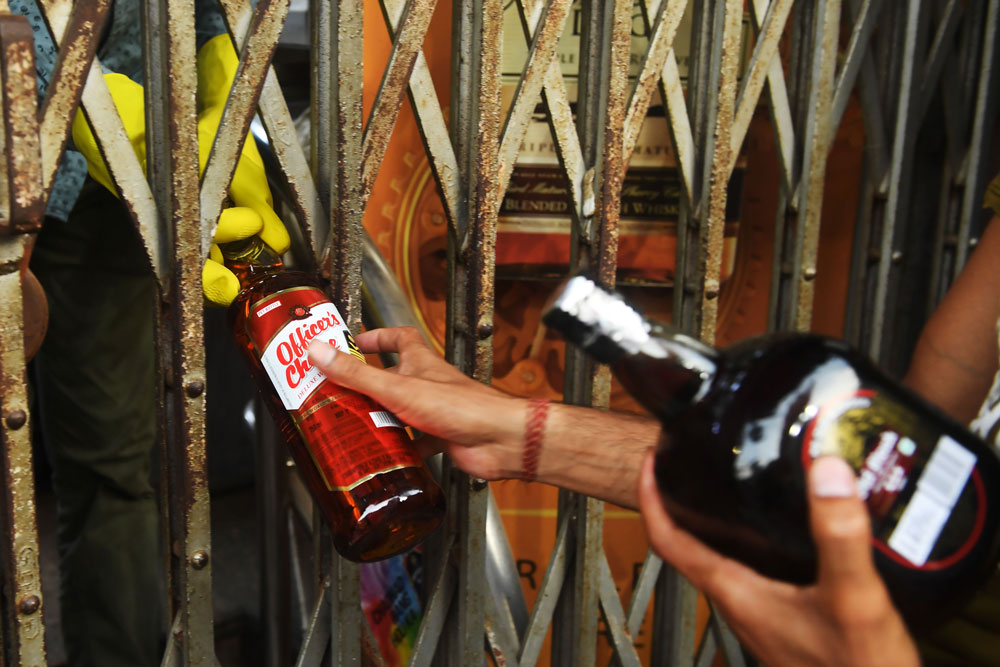
A liquor shop worker wearing gloves gives bottles of alcohol to a customer through the shutters of the shop after the government eased a nationwide lockdown imposed as a preventive measure against the coronavirus, in Kolkata on May 4. Dibyangshu Sarkar/AFP/Getty IMages
New Delhi authorities have imposed a 70% tax on the retail price of alcohol, referring to the levy as a "special corona fee" according to an order issued Monday by the Delhi government.
Any resident of India's capital city will have to pay the tax to purchase alcohol after social distancing measures were violated on Monday, as liquor stores reopened after five weeks.
Chaos ensued after liquor shops opened for the first time in five weeks on Monday in Delhi, with scores of people queuing up outside stores without adequate social distancing, according to a senior district official.
From CNN's Sol Han and Alex Marquardt
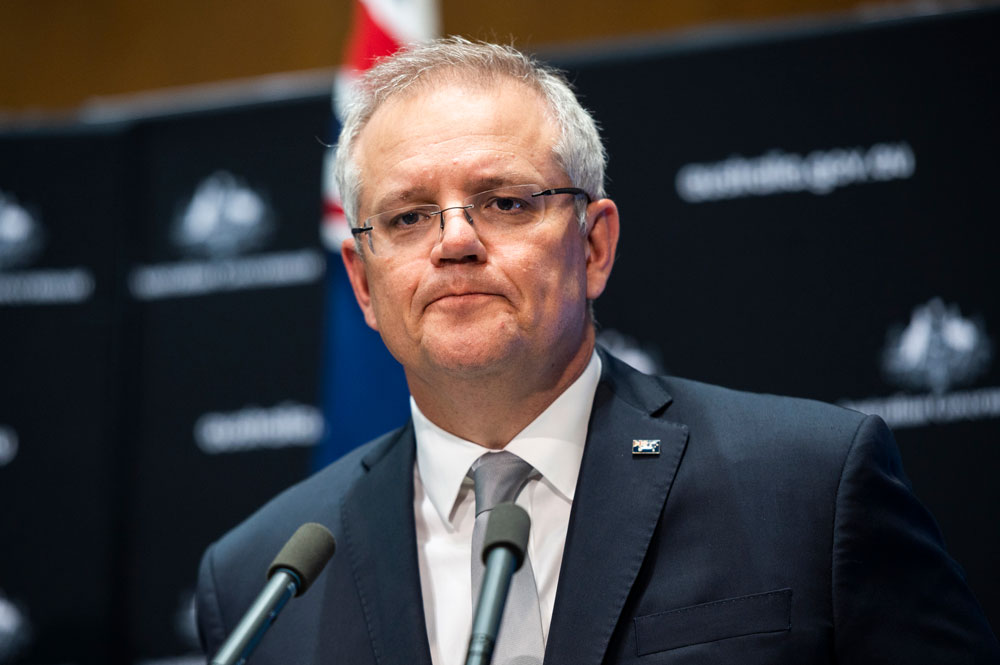
Australian Prime Minister Scott Morrison speaks at a news conference on May 1 in Canberra, Australia. Rohan Thomson/Getty Images
Australian Prime Minister Scott Morrison said that the most likely origin of the coronavirus outbreak was a wildlife wet market as he called for an independent review into the origins of the pandemic.
"The most likely (origin) has been in a wildlife wet market," he said Tuesday.
"What’s really important is that we have a proper review, an independent review, which looks into the sources of these things in a transparent way so we can learn the lessons and to ensure that, were there to be a virus pandemic potential that would originate anywhere else in the world, we can learn the lessons from that," he said.
"That’s what Australia is focused on."
Two leading theories: Morrison's comments follow recent claims from the Trump administration that the novel coronavirus originated from a laboratory, despite scientists in both China and the West saying the virus likely originated in bats.
A senior official in the Office of the Director of National Intelligence (ODNI) acknowledged Monday night that the US has evidence to support both leading theories of where the Covid-19 outbreak originated.
From CNN's Ben Westcott
New Zealand's Prime Minister Jacinda Ardern joined Australian Prime Minister Scott Morrison for Australia's national Cabinet meeting on Tuesday.
It's the first time since World War II that a New Zealand leader has attended Australia's national Cabinet meeting, according to Ardern.
According to Morrison, Ardern was invited to join the meeting to share New Zealand's experience with fighting the coronavirus.
For several weeks, the leaders have been discussing the possibility of a "travel bubble," which would allow people to travel between the two countries without quarantine restrictions.
"There is still a lot of work to be done before we can progress an idea like that, but it's obviously being floated because of the benefits it would bring," Ardern said on Tuesday.
"If we can find a way to make it work with Australia, then that would give that sense of normality, if we can make it work."
Morrison also said the bubble was "some time away."
From CNN's Emma Reynolds, Valentina Di Donato and Stephanie Halasz
Millions of people across Europe were returning to some semblance of their former lives Monday as more countries across the continent began to reopen after weeks or months of coronavirus-related lockdowns.
What's going on around Europe:
Italy: "Phase 2" of Italy's plan to ease restrictions began Monday, with more than 4 million people expected to return to work, some public transport services restored, and many businesses set to reopen, Italy's Prime Minister Giuseppe Conte announced on Facebook. Although industries such as textiles and manufacturing are restarting, many non-essential stores remain closed. While bars and restaurants were allowed to reopen from Monday, they can only offer takeaway.
Germany: German hairdressers opened Monday after weeks of shutdown, but customers are not able to walk in -- they now need an appointment and in Berlin have to fill out a questionnaire. One salon in Hamburg said it was "overrun" by customers, while Udo Walz, a hairdresser to the stars in Berlin, told CNN his salons were booked out for the next three weeks.
Greece: Traffic increased on Greek streets Monday as small stores including hair salons, flower shops and bookstores reopened and lines formed outside electrical appliance retailers, Reuters reported. Greece, which has been praised for its coronavirus response, is planning to welcome tourists again this summer.
United Kingdom: The UK, meanwhile, has not relaxed restrictions yet but is also making plans for returning to work. A draft government plan is looking at staggered starts, maximizing work from home and hygiene measures such as two-meter distancing and physical screens, according to British media reports.
From CNN's Maggie Fox
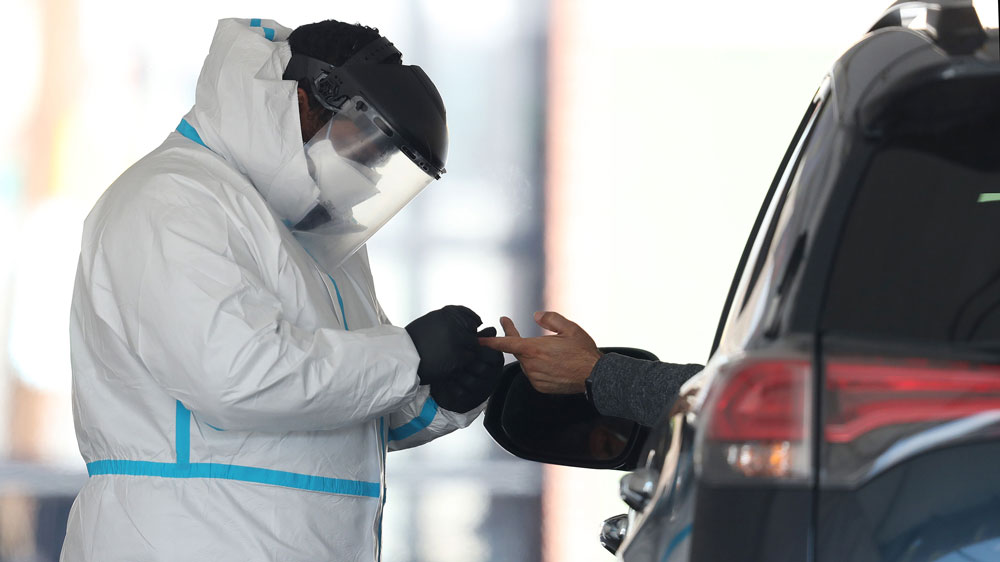
A coronavirus antibody test is administered outside of Delmont Medical Square on April 22 in New York. Al Bello/Getty Images
The United States Food and Drug Administration said Monday it had authorized the first new Covid-19 antibody test that had independent validation from the federal government.
The test, made by New Jersey-based EUROIMMUN US Inc., looks for antibodies to the novel coronavirus to see if people have been infected and recovered.
“The testing was performed at the Frederick National Laboratory for Cancer Research, a Federally Funded Research and Development Center (FFRDC) sponsored by the National Institutes of Health’s (NIH) National Cancer Institute (NCI),” the FDA said in a statement.
What is an antibody test?: Antibody tests look for evidence that someone has been infected with a virus, usually in the past. They can be used to see how many people in the population have been infected, even if they did not show symptoms. The tests could also reveal if people develop any kind of lasting immunity to the virus.
Antibody tests are different from the tests usually used to detect current infections. Those tests look for evidence of the virus itself in a patient.
Questions over inaccuracy: Public health experts have complained that most of the antibody tests now on the market are inaccurate. Even a test that claims to have 95% accuracy can miss up to half of the cases if the virus is not very common in the population being tested.
Source:https://edition.cnn.com/world/live-news/coronavirus-pandemic-05-05-20-intl/index.html
Akhtar Mohammad Makoii
Afghanistan has announced its highest one-day rise of new infections to Covid-19, triggered by a continued surge of transmission in Herat, Kabul and Kandahar amid intensified war across 20 provinces – as the country announced no polio vaccinations were carried out in the last two months.
A total of 330 new Covid-19 patients were confirmed overnight, marking the biggest one-day rise of infections in the war-torn country. Five deaths have also been recorded, pushing the total number of infections to 3,224 and death toll to 95. There have so far been 421 recoveries.
Oliver Holmes
Israel’s defence minister has claimed researchers in the country have made a “significant breakthrough” in a possible treatment for Covid-19 patients.
Naftali Bennett said the Israel Institute for Biological Research (IIBR) developed antibodies – proteins that help the immune system to fight infection – that “can neutralise (the coronavirus) inside carriers’ bodies.”
Bennett had visited the IIBR on Monday where he was briefed “on a significant breakthrough in finding an antidote for the coronavirus”, his office said in a statement. The treatment was currently being patented, and the IIBR was looking to mass-produce it.
It was not clear what timeframe for the treatment being widely available was, or if animal or human trials were due to be conducted.
The announcement follows a similar study by researchers in the Netherlands, who said on Monday that they had developed an antibody that can kill the virus within a lab setting.
Roughly 100 other research groups around the world are currently pursuing vaccines, which would provide immunity from infection.
Fifty-nine of the new cases were confirmed in the western province of Herat, which borders Iran. The total number of infections in Herat stands at 630, with 59 recorded overnight.
Here are the main developments from the last few hours:
Confirmed global death toll exceeds 250,000According to research by both the Reuters news agency and Johns Hopkins University, at least a quarter of a million people are now known to have died as a result of the pandemic. The total number of cases stands at 3,582,469. Experts worry the available data is underplaying the true impact of the pandemic. The Johns Hopkins researchers put the known death toll at 251,510.
Hong Kong economy suffers deepest contraction. Hong Kong’s economy, already damaged by months of protest before the coronavirus outbreak, has recorded its worst decline on record.The region’s GDP shrunk 8.9% year-on-year in the first quarter, the deepest contraction since records began in 1974, and the fourth consecutive quarter to drop. Chief executive Carrie Lam noted it was worse than that experienced during the Asian financial crisis in 1998.
Five Eyes network contradicts theory Covid-19 leaked from lab.There is no current evidence to suggest that coronavirus leaked from a Chinese research laboratory, intelligence sources have told the Guardian, contradicting recent White House claims that there is growing proof this is how the pandemic began.
WHO says has no proof from US on ‘speculative’ Wuhan lab claims. The World Health Organization said Monday that Washington had provided no evidence to support “speculative” claims by US president Donald Trump and Secretary of State, Mike Pompeo, that the new coronavirus originated in a Chinese lab, AFP reports.
Fauci says there is no scientific evidence virus came from Chinese laboratory. Dr. Anthony Fauci, the foremost US expert on infections diseases and a key member of Donald Trump’s coronavirus task force, said in an interview with National Geographic that there is no scientific basis for the theory that coronavirus was man-made in a Chinese laboratory, or escaped from a laboratory after being brought in from the wild.
Chinese state media on Monday denounced Mike Pompeo as “insane”. Pompeo has also joined Trump in attacking the World Health Organization, which said Monday it had no evidence that the virus came out of a laboratory.
Australian Prime Minister Scott Morrison was also asked about the lab theory. Morrison said there had been no change to the Australian position on the theory, which is that no possibilities could be ruled out, but the most likely origin of the virus is a wildlife wet market. He reiterated calls for a “transparent” review into the outbreak and the World Health Organization’s response to the outbreak.
New Zealand records no new cases for second day in a row, as the government considers whether to further relax the country’s lockdown restrictions. Monday was the first time since before New Zealand’s national shutdown began on 25 March that there were no new cases of the virus diagnosed.
Australia and New Zealand confirm plans for “safe travel zone”. Australian Prime Minister Scott Morrison and New Zealand Prime Minister Jacinda Ardern have officially confirmed plans for a “safe travel zone” between the two countries. Morrison warned it is “still some time away,” however.
Germany set to ease restrictions – report. Germany’s state premiers will agree on further measures to ease restrictions during a telephone call with the chancellor Angela Merkel on Wednesday, Reuters reports, citing two people familiar with the preparations.
French hospital discovers Covid-19 case from December. The hospital retested old samples from pneumonia patients and discovered that it treated a man who had Covid-19 as early as 27 December, nearly a month before the French government confirmed its first cases.
Italy’s death toll far higher than reported. Statistics bureau ISTAT said its analysis showed an extra 11,600 deaths were unaccounted for, and it was reasonable to assume these people either died of Covid-19 without being tested or that the extra stress on the health system due to the epidemic meant they died of other causes they were not treated for.
World leaders pledge $8bn to fight coronavirus. At a video-conference summit hosted by the European Union, Japan pledged more than $800m while Germany offered €525m. Italy and Spain each said they would provide more than €100m.
Austrian unemployment at all-time high. The coronavirus pandemic has pushed the number of unemployed Austrians to historically high levels, with a year-on-year rise of almost 60%.
Carnival to resume cruises in August. Carnival Cruise Line has announced plans to resume operations at the beginning of August despite dozens of deaths on cruise ships during the Covid-19 pandemic and investigations into the industry’s possible role in spreading the disease around the globe.
Plane carrying aid supplies crashes in Somalia. The accident, involving an African Express Airways plane, killed seven people on board, a security official said.
US supreme court hears arguments by teleconference for first time. In a break from tradition caused by the coronavirus pandemic, the nine justices participated remotely via a dial-in format, while the audio feed was broadcast live.